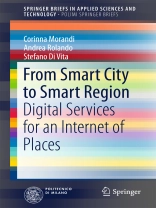This book offers a fascinating exploration of the relationship between information and communication technologies (ICTs) and spatial planning, expanding the concept of “urban smartness” from the usual scale of buildings or urban projects to the regional dimension. In particular, it presents the outcomes of research undertaken at Politecnico di Milano, in collaboration with Telecom Italia, that had three principal goals: to investigate the use of ICTs for the representation, promotion, management, and dissemination of an integrated system of services; to explore the spatial impacts of digital services at different scales (regional, urban, local); and to understand how a system of mobile services can encourage new spatial uses and new collective behavior in the quest for better spatial quality of places. Useful critical analysis of international case studies is also included with the aim of verifying the opportunities afforded by new digital services not only to improve the urban efficiency but also to foster the evolution of urban communities through enhancement of the public realm. The book will be a source of valuable insights for both scholars and local administrators and operators involved in smart city projects.
Inhoudsopgave
How can ICTs be Drivers of Spatial Innovation? Urban Digital Nodes for the Smart Region between Milan and Turin.- The Background: a Critical Analysis of the Ongoing Milan ICT Projects.- Two Applied Research Pilot Projects: Spatial Impacts and Potentials of ICTs.-Reference case studies and best practices.-Looking at the future?.












